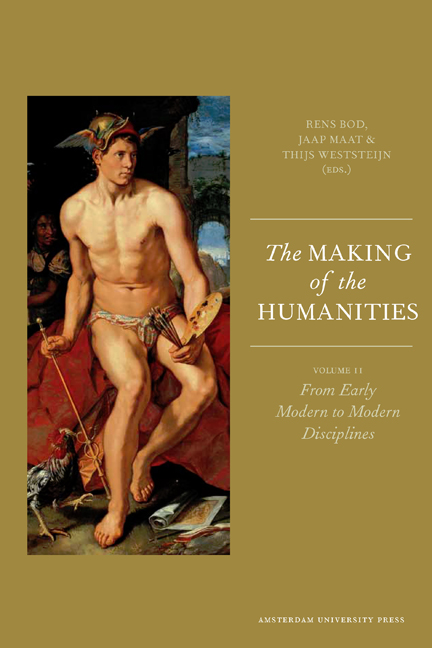Book contents
- Frontmatter
- Contents
- Introduction: The Dawn of the Modern Humanities
- I Linguistics and Philology
- II The Humanities and the Sciences
- III Writing History and Intellectual History
- IV The Impact of the East
- V Artworks and Texts
- VI Literature and Rhetoric
- VII Academic Communities
- Contributors
- List of Figures
- Index
Bourgeois versus Aristocratic Models of Scholarship: Medieval Studies at the Académie des Inscriptions, 1701-1751
Published online by Cambridge University Press: 19 January 2021
- Frontmatter
- Contents
- Introduction: The Dawn of the Modern Humanities
- I Linguistics and Philology
- II The Humanities and the Sciences
- III Writing History and Intellectual History
- IV The Impact of the East
- V Artworks and Texts
- VI Literature and Rhetoric
- VII Academic Communities
- Contributors
- List of Figures
- Index
Summary
Much attention has recently been focused on the construction of new, bourgeois models of authorship during the course of the French Enlightenment Less attention has however been paid to the concomitant emergence of bourgeois models of scholarship, that indeed went hand in hand with the increasing autonomization of the literary field at large. Similarly to the case of literary authors, the construction of new models of the professional – as opposed to the amateur – scholar owed much, in turn, to the creation of secular institutions capable of supporting this emerging category. Libraries accessible to the public, official associations, and state-supported academies all played a crucial role in the professionalization of the humanities. During the early decades of the eighteenth century, one of these institutions was the Académie royale des Inscriptions et Belles Lettres. Originally founded by Louis XIV to compose Latin commemorative inscriptions in his honour, the Academy gradually evolved into a scholarly body, focusing more exclusively on historical and philological activities. This increasing autonomy and shift in emphasis was marked by the reorganization of the academy in 1701, accompanied by the drawing up of new statutes. The movement was consolidated, finally, by the creation of a prestigious new academic journal, the Histoire et Mémoires de l’Académie des Inscriptions et Belles Lettres, that began publication in 1717 and continued uninterrupted until the revolutionary era.
Yet even following its reform, two models of scholarship continued to find a home in the Académie des Inscriptions during the first decades of the eighteenth century: an older, aristocratic model of amateur scholarship, and a newer, bourgeois model of professional historiography, that only really carried the day in the second half of the eighteenth century, when the rising party of progressive, secular intellectuals began to consolidate its hold on public opinion. While recent studies have foregrounded the academicians’ slowness to adopt the methods and approaches of modern historical scholarship – including reliance on archaeological and non-literary sources – they have not sufficiently noted the way class allegiances also underlay differing stances with regard to the methods and aims of scholarship.
- Type
- Chapter
- Information
- The Making of the HumanitiesVolume II: From Early Modern to Modern Disciplines, pp. 303 - 320Publisher: Amsterdam University PressPrint publication year: 2012



